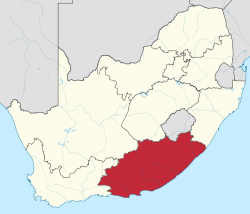
Back Oos-Kaap Afrikaans كيب الشرقية Arabic Cabu Oriental AST Şərqi Keyp vilayəti Azerbaijani Усходне-Капская правінцыя Byelorussian Усходняя Капская правінцыя BE-X-OLD Източен Кейп Bulgarian পূর্ব কেপ Bengali/Bangla Kab ar Reter Breton Cap Oriental Catalan
Eastern Cape
| |
|---|---|
| Motto: Development through Unity | |
 Location of the Eastern Cape in South Africa | |
| Coordinates: 32°S 27°E / 32°S 27°E | |
| Country | |
| Established | 27 April 1994 |
| Capital | Bhisho |
| Largest city | Gqeberha (Port Elizabeth) |
| Districts | |
| Government | |
| • Type | Parliamentary system |
| • Premier | Oscar Mabuyane (ANC) |
| • Legislature | Eastern Cape Provincial Legislature |
| Area [1]: 9 | |
| • Total | 168,966 km2 (65,238 sq mi) |
| • Rank | 2nd in South Africa |
| Highest elevation | 3,019 m (9,905 ft) |
| Lowest elevation | 0 m (0 ft) |
| Population (2022)[2] | |
| • Total | 7,225,784 |
| • Rank | 4th in South Africa |
| • Density | 43/km2 (110/sq mi) |
| • Rank | 6th in South Africa |
| Population groups | |
| • African | 85.6% |
| • Coloured | 7.6% |
| • White | 5.6% |
| • Indian or Asian | 0.5% |
| • Other | 0.7% |
| Languages [1]: 25 | |
| • Xhosa | 78.8% |
| • Afrikaans | 10.6% |
| • English | 5.6% |
| • Sotho | 2.5% |
| Time zone | UTC+2 (SAST) |
| ISO 3166 code | ZA-EC |
| HDI (2019) | 0.671[3] medium · 9th of 9 |
| GDP | US$30.7 billion[4] |
| Website | www.ecprov.gov.za |
| Xhosa | iMpuma-Kapa |
|---|---|
| Afrikaans | Oos-Kaap |
| Setswana | Kapa Botlhaba |
The Eastern Cape (Xhosa: iMpuma-Kapa; Afrikaans: Oos-Kaap [ˈuəs.kɑːp]) is one of the nine provinces of South Africa. Its capital is Bhisho, but its two largest cities are East London and Gqeberha. Due to its climate and nineteenth century towns, it is a common location for tourists. It is also known for being home to many anti-apartheid activists, the most famous being Nelson Mandela hailing from the province.
The second largest province in the country (at 168,966 km2) after the Northern Cape, it was formed in 1994 out of the Xhosa homelands or bantustans of Transkei and Ciskei, together with the eastern portion of the Cape Province. The central and eastern part of the province is the traditional home of the indigenous Xhosa people. In 1820 this area, which was known as the Xhosa Kingdom, began to be settled by Europeans who originally came from England, Scotland and Ireland.
Since South Africa's early years, many Xhosas believed in Africanism, and figures such as Walter Rhubusana believed that the rights of Xhosa people and Africans in general, could not be protected unless Africans mobilised and worked together. As a result, the Eastern Cape is home to many anti-apartheid leaders such as Robert Sobukwe, Oliver Tambo, Nelson Mandela, Walter Sisulu, Winnie Mandela, Govan Mbeki, Alfred Xuma, Cecilia Makiwane, Noni Jabavu, Thabo Mbeki, Chris Hani, Bantu Holomisa, Steve Biko, musicians Miriam Makeba, Madosini, Nathi, Dali Mpofu, Vusi Nova and Zahara, as well as historical figures such as Rev. Tiyo Soga, Samuel Mqhayi, Mongezi Sifika wa Nkomo, Enoch Sontonga and Jotello Festiri Soga.
- ^ a b Census 2011: Census in brief (PDF). Pretoria: Statistics South Africa. 2012. ISBN 9780621413885. Archived (PDF) from the original on 13 May 2015.
- ^ a b https://www.thepresidency.gov.za/download/file/fid/2889.
{{cite web}}: Missing or empty|title=(help) - ^ "Sub-national HDI – Area Database – Global Data Lab". hdi.globaldatalab.org. Archived from the original on 23 September 2018. Retrieved 13 September 2018.
- ^ "Provincial gross domestic product:experimental estimates, 2013–2022" (PDF), www.statssa.gov.za
© MMXXIII Rich X Search. We shall prevail. All rights reserved. Rich X Search
